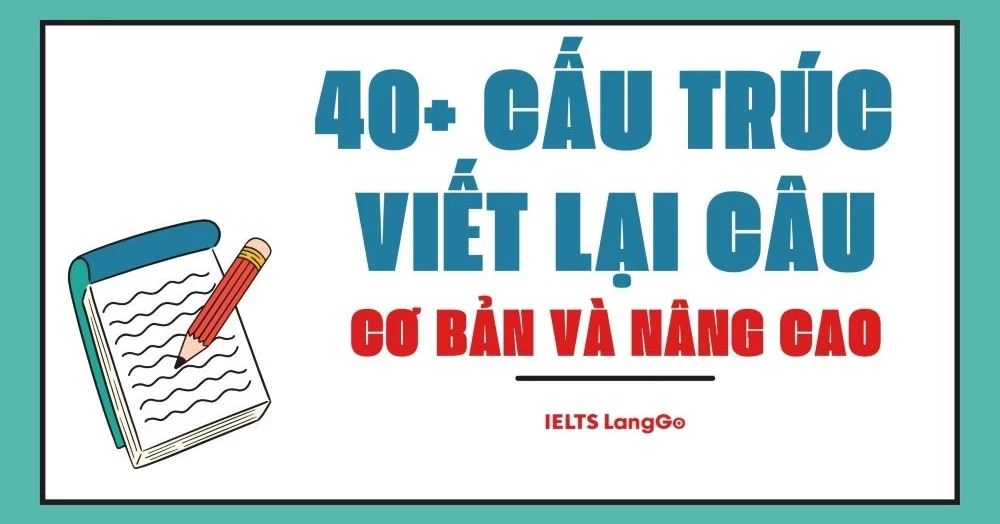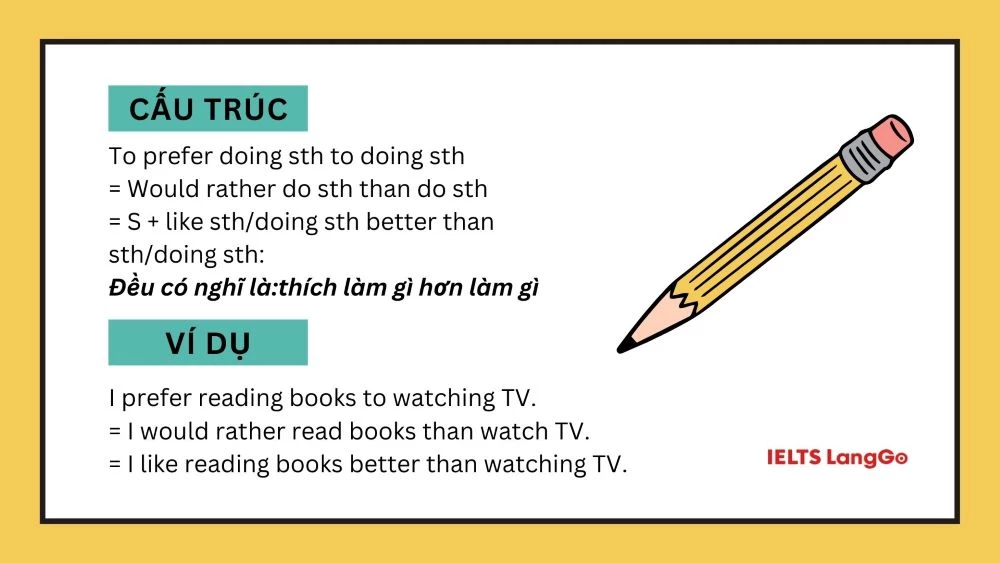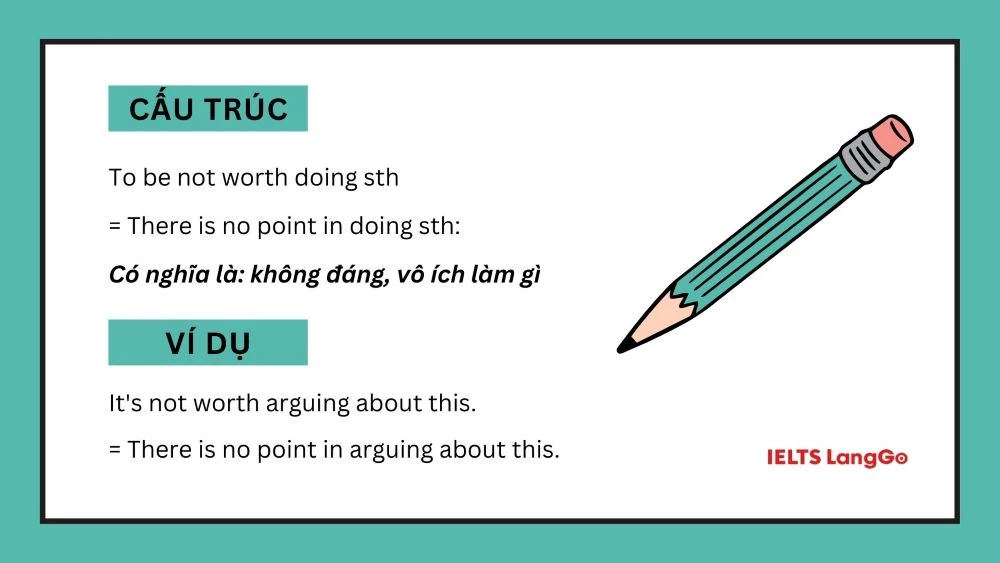


Cấu trúc VIẾT LẠI CÂU tiếng Anh là loại bài tập quá quen thuộc, đặc biệt là trong các kì thi Đại học, TOEIC, IELTS,... ở cả 4 kĩ năng tiếng Anh nghe-nói-đọc-viết. Các cấu trúc viết lại câu cơ bản và nâng cao là dạng bài liên quan đến kỹ năng paraphrasing (diễn giải) với độ khó tùy theo mức độ giao tiếp hay học thuật.
Trong bài viết này, LangGo sẽ giới thiệu đến bạn những cấu trúc viết lại câu tiếng Anh thông dụng nhất để bạn dễ dàng áp dụng trong nhiều hoàn cảnh.
Viết lại câu sao cho nghĩa không đổi trong tiếng Anh là kỹ năng diễn đạt lại một ý tưởng bằng cách sử dụng từ vựng, cấu trúc ngữ pháp hoặc cách diễn đạt khác mà vẫn giữ nguyên ý nghĩa ban đầu.
Sau đây là 36 cấu trúc viết lại câu thông dụng trong tiếng Anh bạn nên nắm vững. Các cấu trúc nâng cao được trình bày ở phần 2.
1. To prefer doing sth to doing sth = Would rather do sth than do sth = S + like sth/doing sth better than sth/doing sth: thích làm gì hơn làm gì
Ví dụ:
Gốc: I prefer reading books to watching TV.
= I would rather read books than watch TV.
= I like reading books better than watching TV.
2. To look at (v) = To have a look at (n): nhìn vào
Ví dụ: Let's look at this painting. = Let's have a look at this painting.
3. To think about = To give thought to: nghĩ về
Ví dụ: I'm thinking about my future. = I'm giving thought to my future.
4. It's one's duty to do sth = S + be + supposed to do sth: có nghĩa vụ làm gì
Ví dụ: It's your duty to report this incident. = You are supposed to report this incident.

5. To be determined to = To have a determination to: dự định
Ví dụ: She is determined to finish the project. = She has a determination to finish the project.
6. To know (about) = To have knowledge of: biết
Ví dụ: Do you know about the new policy? = Do you have knowledge of the new policy?
7. To be not worth doing sth = There is no point in doing sth: không đáng, vô ích làm gì
Ví dụ: It's not worth arguing about this. = There is no point in arguing about this.
8. To tend to = To have a tendency to: có khuynh hướng
Ví dụ: He tends to be late for meetings. = He has a tendency to be late for meetings.
9. To intend to +inf = To have intention of + V_ing: dự định
Ví dụ: We intend to travel next summer. = We have the intention of traveling next summer.
10. To desire to = Have a desire to: khao khát, mong muốn
Ví dụ: They desire to improve their skills. = They have a desire to improve their skills.
11. To succeed in doing sth = Manage to do sth: làm việc gì thành công
Ví dụ: She succeeded in winning the competition. = She managed to win the competition.
12. To wish = To have a wish / To express a wish: ao ước
Ví dụ: I wish to go to Paris. = I have a wish to go to Paris.
13. To visit Sb = To pay a visit to Sb / To pay Sb a visit: thăm viếng
Ví dụ: We'll visit our grandparents next week. = We'll pay a visit to our grandparents next week.
14. To discuss Sth = To have a discussion about: thảo luận
Ví dụ: Let's discuss the proposal. = Let's have a discussion about the proposal.
15. Can = To be able to = To be possible: có thể làm gì
Ví dụ: Can you help me? = Are you able to help me? = Is it possible for you to help me?
16. To decide to = To make a decision to: quyết định
Ví dụ: They decided to move to a new city. = They made a decision to move to a new city.
17. To talk to = To have a talk with: nói chuyện
Ví dụ: I need to talk to my boss. = I need to have a talk with my boss.
18. Understand = To be aware of: hiểu, nhận thức
Ví dụ: Do you understand the situation? = Are you aware of the situation?
19. To explain Sth = To give an explanation for: giải thích
Ví dụ: Can you explain this concept? = Can you give an explanation for this concept?
20. To call Sb = To give Sb a call: gọi điện cho...
Ví dụ: I'll call you tomorrow. = I'll give you a call tomorrow.
21. To be interested in = To have interest in: thích
Ví dụ: She is interested in photography. = She has interest in photography.
22. Because + clause = Because of + N: bởi vì
Ví dụ: We couldn't go out because it was raining. = We couldn't go out because of the rain.
23. To drink = To have a drink: uống
Ví dụ: Let's drink something. = Let's have a drink.
24. It seems that = It appears that = It is likely that = It looks as if/as though: dường như, có vẻ như
Ví dụ: It seems that he's not coming. = It appears that he's not coming. = It is likely that he's not coming. = It looks as if he's not coming.
25. To photograph = To have a photograph of: chụp hình
Ví dụ: I want to photograph this landscape. = I want to have a photograph of this landscape.
26. To cry = To give a cry: khóc kêu
Ví dụ: The baby cried when it woke up. = The baby gave a cry when it woke up.
27. To laugh at = To give a laugh at: cười nhạo
Ví dụ: Don't laugh at his mistakes. = Don't give a laugh at his mistakes.
28. Like = To be interested in = Enjoy = Keen on = Fond of sth: yêu thích cái gì
Ví dụ: I like classical music. = I'm interested in classical music. = I enjoy classical music. = I'm keen on classical music. = I'm fond of classical music.
29. To welcome Sb = To give Sb a welcome: chào đón
Ví dụ: They welcomed us warmly. = They gave us a warm welcome.
30. To kiss Sb = To give Sb a kiss: hôn
Ví dụ: She kissed her child goodnight. = She gave her child a goodnight kiss.
31. S + often + V = S + be used to + Ving/N = S + be accustomed to + Ving: thường/quen với làm gì
Ví dụ: He often goes for a walk in the evening. = He is used to going for a walk in the evening. = He is accustomed to going for a walk in the evening.
32. To ring Sb = To give Sb a ring: gọi điện
Ví dụ: I'll ring you later. = I'll give you a ring later.
33. To warn = To give warning: báo động, cảnh báo
Ví dụ: The lifeguard warned the swimmers about the strong currents. = The lifeguard gave a warning to the swimmers about the strong currents.

34. Although + clause = Despite + N = In spite of + N: mặc dù, bất chấp
Ví dụ: Although it was raining, we went for a walk. = Despite the rain, we went for a walk. = In spite of the rain, we went for a walk.
35. To try to (+inf) = To make an effort to / To make an attempt to: cố gắng
Ví dụ: She's trying to learn Japanese. = She's making an effort to learn Japanese. = She's making an attempt to learn Japanese.
36. To meet Sb = To have a meeting with Sb: gặp ai
Ví dụ: I'm going to meet John tomorrow. = I'm going to have a meeting with John tomorrow.
32 nguồn tự luyện nghe Tiếng Anh mỗi ngày: Từ cơ bản đến nâng cao
Tổng hợp 100 phrasal verb thông dụng trong tiếng Anh giao tiếp
Sau khi đã làm quen với các cấu trúc viết lại câu cơ bản, chúng ta sẽ tiến tới khám phá những cấu trúc nâng cao hơn. Những cấu trúc này đòi hỏi sự hiểu biết sâu sắc về ngữ pháp và khả năng sử dụng ngôn ngữ linh hoạt.
1. Sử dụng mệnh đề rút gọn:
Cấu trúc: Rút gọn mệnh đề phụ thành cụm động từ (V-ing hoặc V3/ed)
Ví dụ:
2. Đảo ngữ với các cụm từ phủ định:
Cấu trúc: Đưa cụm từ phủ định lên đầu câu, đảo ngữ chủ - động từ
Ví dụ:
3. Sử dụng cấu trúc nhấn mạnh "What":
Cấu trúc: Bắt đầu câu bằng "What" để nhấn mạnh một phần của câu
Ví dụ:
4. Chuyển đổi giữa mệnh đề danh từ và động từ nguyên mẫu:
Cấu trúc: Thay thế mệnh đề danh từ bằng động từ nguyên mẫu hoặc ngược lại
Ví dụ:
5. Sử dụng cấu trúc song hành:
Cấu trúc: Sử dụng các cấu trúc có hình thức tương tự nhau trong một câu
Ví dụ:
6. Chuyển đổi giữa mệnh đề quan hệ xác định và không xác định:
Cấu trúc: Thêm hoặc bỏ dấu phẩy để chuyển đổi loại mệnh đề quan hệ
Ví dụ:
7. Sử dụng cấu trúc "No sooner... than":
Cấu trúc: Thay thế "as soon as" bằng "No sooner... than" với đảo ngữ
Ví dụ:
8. Chuyển đổi giữa mệnh đề trạng ngữ và cụm giới từ:
Cấu trúc: Thay thế mệnh đề trạng ngữ bằng cụm giới từ hoặc ngược lại
Ví dụ:
9. Sử dụng cấu trúc "Not only... but also":
Cấu trúc: Nhấn mạnh hai yếu tố trong câu bằng cách sử dụng "Not only... but also"
Ví dụ:
10. Chuyển đổi giữa câu đơn và câu phức sử dụng liên từ phức:
Cấu trúc: Sử dụng các liên từ phức như "despite the fact that", "in spite of", "regardless of"
Ví dụ:
Hướng dẫn: Viết lại các câu sau đây sử dụng cấu trúc được đề xuất trong ngoặc đơn mà không làm thay đổi nghĩa của câu.
Đáp án Bài tập 1:
Hướng dẫn: Chọn cấu trúc phù hợp nhất từ danh sách đã học để hoàn thành các câu sau.
Đáp án Bài tập 2:
Với sự kiên trì và thực hành đều đặn, bạn chắc chắn sẽ thấy sự tiến bộ đáng kể trong khả năng sử dụng ngôn ngữ của mình. Hãy tiếp tục rèn luyện và không ngừng khám phá những cách thức mới để diễn đạt ý tưởng của bạn trong tiếng Anh.
Chúc bạn thành công trên con đường chinh phục ngôn ngữ này! Nếu cần sự trợ giúp thì đừng ngần ngại liên hệ với IELTS LangGo nhé!
LangGo chúc bạn học tốt tiếng Anh!



ĐẶT LỊCH TƯ VẤN MIỄN PHÍ LỘ TRÌNH Săn ƯU ĐÃI lên tới 12.000.000đ